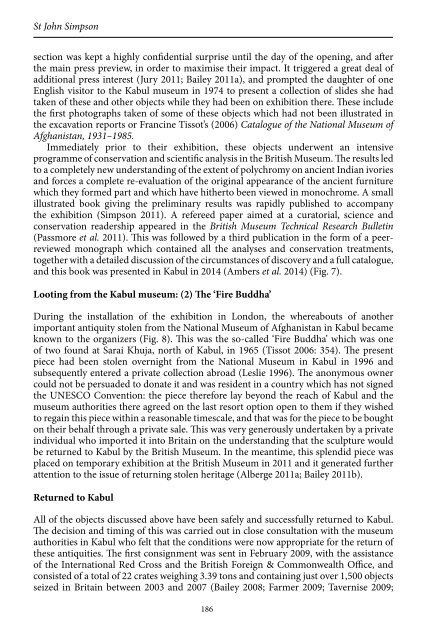Countering
Book_observatory_illicit_traffic_version%20issuu
Book_observatory_illicit_traffic_version%20issuu
Create successful ePaper yourself
Turn your PDF publications into a flip-book with our unique Google optimized e-Paper software.
Back to Kabul<br />
Hiebert & Cambon eds. 2011: 31; Masoudi 2012, p. 15). A selection of these objects was<br />
later put on display in the National Museum of Afghanistan in Kabul and the exhibition<br />
opened on 6 October 2009 by Mark Sedwill, then Acting British Ambassador in Kabul,<br />
and Abdul Karim Khurram, then Minister for Information and Culture in Afghanistan<br />
(Masoudi 2012, Fig. 12).<br />
In July 2012, immediately before the opening of the Olympic Games in London, the<br />
Begram ivories, the Sarai Khuja Buddha and the second consignment of illicitly excavated<br />
objects were carefully packed and despatched to Kabul with the assistance of the British<br />
Armed Forces, and a fully illustrated inventory and a set of condition reports were handed<br />
in advance to Dr Masoudi (Figs. 9-10). The safe return of this second consignment was<br />
announced on 19 July by Prime Minister David Cameron during the course of an official<br />
visit to Kabul. This was followed by a formal hand-over ceremony at the museum in<br />
Kabul on 5 August 2012 with Colin Crorkin, the British Consul General in Afghanistan,<br />
acting on behalf of the British Museum. Identical press releases in Dari and English were<br />
simultaneously issued by the National Museum of Afghanistan and the British Museum,<br />
and a number of local and international press stories followed immediately (e.g., Alberge<br />
2012; Farmer 2012; Ralph 2012). In addition, footage was released by the Ministry of<br />
Defence and a blog post simultaneously issued on the British Museum website at URL:<br />
< http://blog.britishmuseum.org/category/exhibitions/afghanistan-crossroads-of-theancient-world/<br />
>.<br />
Conclusion<br />
These examples highlight some of the areas of very successful collaboration which the<br />
two museums have enjoyed in the past years. They also highlight several key points.<br />
The first is the effectiveness of close cooperation between different organizations, in this<br />
case between two national museums, the UK Border Force and the Metropolitan Police<br />
in London. These relationships were built over time with regular dialogue and trust,<br />
and underpinned by official Memoranda of Understanding. Seizing the opportunity to<br />
catalogue confiscated objects, use scientific techniques where possible, and publishing<br />
the results are also important outcomes of these actions and they help compensate for<br />
the loss of archaeological context, offer more information to the receiving museum, and<br />
create a full and open record for the academic as well as the law enforcement community.<br />
It is essential that the wider public is aware of what can and is being done, and to highlight<br />
positive outcomes rather than simply dwell on the problems without offering solutions.<br />
This approach underlines the importance of harnessing the considerable public and<br />
media interest in this topic by issuing regular reports which highlight positive results.<br />
These stories reach a huge global audience and build awareness of international efforts<br />
to combat illegal trafficking. They show that museums have an important role in this<br />
process as they are centres of specialist knowledge in ancient cultures, have curators who<br />
understand objects and they share the same fundamental concerns over the preservation,<br />
interpretation and display of past or living cultures.<br />
Bibliography<br />
Akhtar, A. & Neubacher, B. 1998. ‘An interview with Prof. A. H. Dani’. In SPACH<br />
Newsletter 4 (April): 3–4.<br />
Alberge, Dalya. 2003. ‘Looters dig into Afghanistan’s ancient heritage’. In The Times,<br />
187


